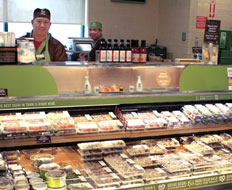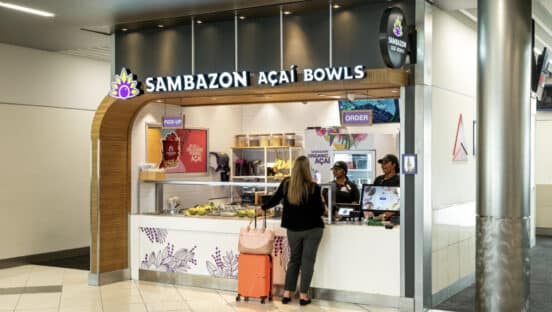Quick-service sushi concepts, from How Do You Roll? to Yo! Sushi, have taken off in the U.S., with Americans’ increasingly adventurous palates driving growth. And Genji Sushi, which first opened its doors in Philadelphia in 1997, is a quiet leader in the category, with 165 units.
But Genji has a trick up its sleeve that’s helped build the brand into such a sushi success: The concept operates exclusively within Whole Foods Market stores.
“Whole Foods provides us with an engaged customer base, wealth of best practices, and a commitment to keep providing us the opportunity to grow with them,” says Ken Blakeman, marketing director for Genji. “It’s a symbiotic relationship—when they grow, we grow.”
Genji is a 100 percent privately held company; Whole Foods does not own a stake. Blakeman says Genji’s decision to partner with Whole Foods was made because the original owners, Hideo and Yuko Omori, needed help sustaining the business’s quick growth.
“The Whole Foods team approached them to see if they would be interested in operating a few sushi bars within their stores,” Blakeman says. “The family welcomed the opportunity and quickly formed a strong relationship with Whole Foods.”
The partnership has paid off, he says, because the two companies share the same target customers: food lovers who appreciate and expect the highest-quality ingredients.
Finding such a solid partnership has driven other grocery stores and supermarkets, from Kroger’s to Walmart, to partner with established foodservice brands. Even Whole Foods partners with other quick serves, including Jamba Juice.
But independent vendors operating within a grocery store like Whole Foods encounter unique challenges.
“The biggest challenge is two parallel cultures coexisting and prospering together,” Blakeman says. “It’s important to find partnerships that already share similarities—common values, goals, and overall synergy. It makes the relationship smoother and more successful for both.”
There are logistics issues, as well, like physical space. Grocery stores often have back-of-the-house limitations that incoming vendors must adapt to.
“When you own your own restaurant, you can grow based on your own needs,” Blakeman says. “You can customize the product based on the amount of space in the front of the house and in the back. Storage space [within a grocery store] can be an issue because everything is tight.”
Gary Stibel, founder and CEO of The New England Consulting Group, says space and cultural differences are not the only challenges independent vendors encounter. Location is also critical.
“If you stick the vendor in the corner, where no one travels, then customers won’t even know they are there,” he says.
Stibel says that to be successful, quick-serve vendors within grocery stores need to be located closer to the front of the unit or on the side, where customers can see their food and products.
Blakeman says competition can also be tough, between in-store departments and outside brands. “We also see ourselves competing with healthy [quick-service] and fast-casual options out there, from salads to better burgers to burritos,” he says. “Not just Asian concepts.”
Lastly, independent restaurants can lose a sense of freedom by choosing to operate within a pre-established store, Blakeman says.
This, Stible says, is the “price of admission.”
“It’s like if you invite a guest to stay in your house; there are rules they must follow,” he says. “You lose a lot of freedom, but you do it because it’s good for your business. If you do a deal like this, the freedom lost is worth the benefits you gain.”
Indeed, Stibel says business can boom for operators who are smart about their growth within grocery stores or markets.
“The smart ones are doing very well,” he says. “Because so much of the normal work of finding a location, negotiating rent, cleaning the sidewalks after it snows, etc., is done for them. It’s like comparing living in a condo to living in an apartment. In that sense, the good operators are doing very well.”









